Passages: Ted Newland, Coach Emeritus of UC Irvine Men’s Water Polo, Passes Away at 91
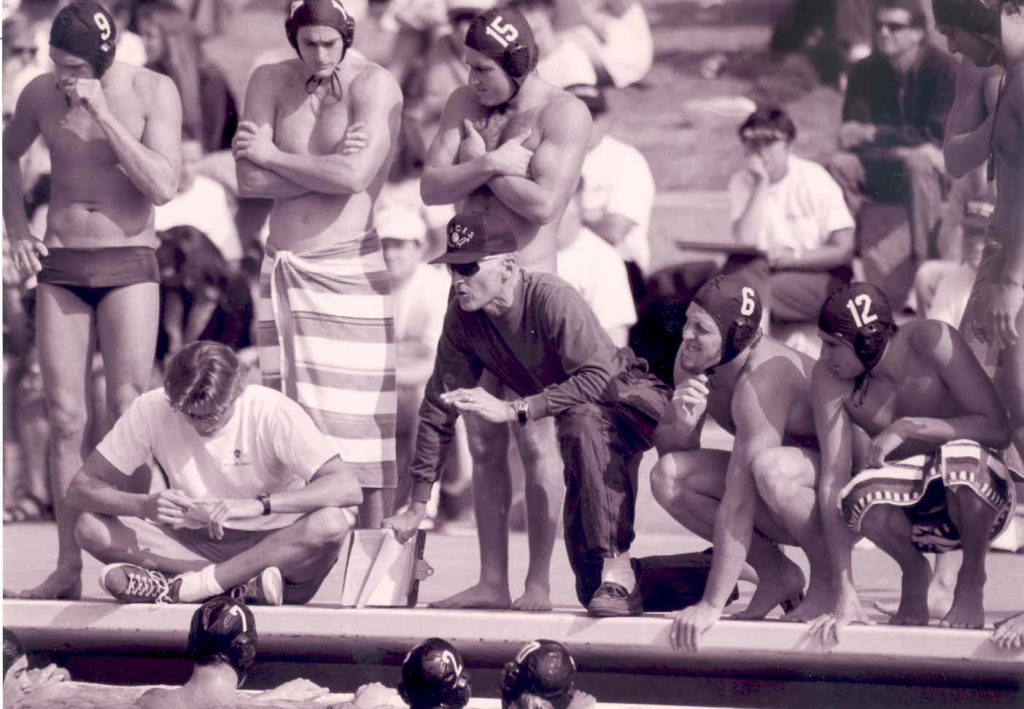
His players affectionately called him “The Old Man.” And he treated them like family—one that stretched into the hundreds. “That’s why all of his boys were sons-in-law,” said Gary Figueroa, who really was a son-in law.
The “he” in question is legendary University of California at Irvine Head Coach Edward “Ted” Newland, who last week passed away at the age of 91.
When he retired in 2005 Newland owned the record for most victories (714) in NCAA varsity water polo history; that’s what happens if you’re good, and stay with one program for 39 years. And stay at Irvine Newland did, leading them to three NCAA titles—and six second place finishes too, many at the hands of Pete Cutino-helmed teams from Cal.
He coached in the golden age of U.S. polo—when Team USA won back-to-back Olympic silver medals in 1984 and 1988—and competed against some of the best water polo coaches America ever produced—Cutino, Bob Horn at UCLA, Pete Snyder at University of California-Santa Barbara and Dante Dettamanti at Stanford. Of that august quartet, only Snyder, whose program collected an NCAA title in 1979—the Gaucho men’s sole championship—could appreciate the hurdles that a public university with a relatively small athletic budget had to overcome in sustaining a sport as demanding as water polo.
But the Old Man was not one to be deterred by obstacles. In fact, he relished challenges.
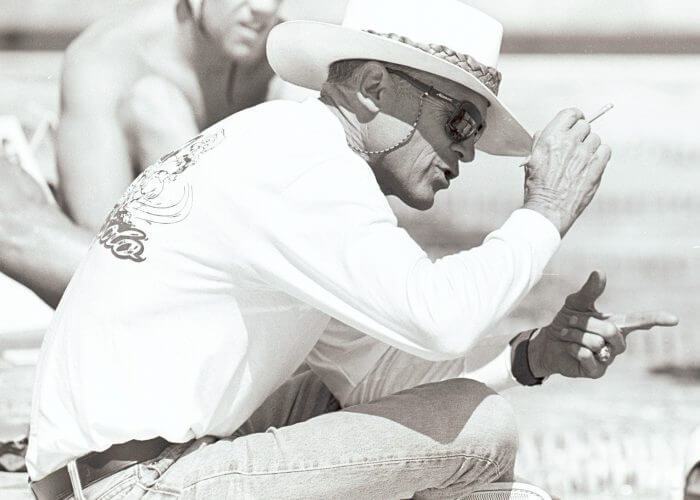
Photo Courtesy: UC Irvine Athletics
“Work begets its own talent,” Jim Kruse, who played for Newland in the early 70s, said by phone. “He was all about a work ethic, and felt that people could really accomplish anything they wanted—if they were willing to put in the work.”
An All-American who won a title in 1970, when the Anteaters beat the mighty Bruins of UCLA in sudden-death overtime, Kruse said his former coach believed: “The strong take from the weak, the smart take from the dumb—but the strong and the smart take from everyone.”
But it wasn’t all about competition; life was to be enjoyed. According to Kruse, the Old Man was fond of saying: “There are five things I really enjoy doing, and I make sure I do four of them every day.”
And, by all accounts, Newland did enjoy life, especially the water polo part.
A firm believer that effort is the difference between winning and losing, he made damn sure his players were as well prepared as possible. But, he didn’t ask more of them than he asked of himself. If the team was scheduled to lift weights early, their coach arrived an hour before them. According to Kruse, Coach would do two or three thousand sit-ups before his players arrived for a 5 a.m. workout.
Figueroa, who had the gumption to marry the coach’s daughter Margaret, said the Newland philosophy was crystal clear: work harder than the next guy.
“Anybody from that era would agree: UCI outworked everybody,” said Figueroa, whose Anteater teams failed to overcome Cal in national championship matches in 1974, ’75 and ’77. “I think they changed all the NCAA rules, restricting how much time you could put in because of Newland and probably Bobby Knight—these guys just outworked everybody.”
But it was not sheer punishment; the master strategist had a purpose sustaining his mania.
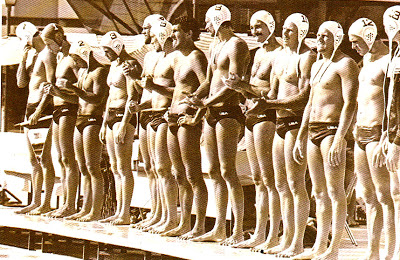
1984 U.S. Olympic men; #2 is Kevin Robertson; #3 is Gary Figueroa. Photo Courtesy: Water Polo Legends
“What was unique about Newland is, we accepted the work, so there had to be love there. If you’re punishing people by outworking others, it doesn’t work,” he said.
“It was positivity along with a commitment, that if this guy will outwork us, we will outwork the opponent,” added Figueroa, the Most Outstanding Player of the 1977 tournament who earned perhaps the Old Man’s highest accolade: admittance into the Newland clan. The other man so gifted? Kevin Robertson, a chief antagonist from Cal who married Tricia Newland.
“His two daughters—both beautiful and athletic—married two of the finest players the United States have ever had: Gary Figueroa and Kevin Robertson.” Kruse said. “They were both Olympians and very good ones.”
Figueroa is a member of a unique fraternity of Anteaters: 12 men who played for the Old Man and represented their country at the Olympics. The sport’s highest distinction, “Olympian” is recognition of effort and ambition—and, in this case, Newland—who drove those men, and many others, to success in the pool and out.
“He believed he could shape and mold players,” said Kruse who has gone on to a successful career in real estate development. “He loved taking guys and making them into something. And that didn’t stop at the pool deck. He loved putting guys into medical school, into the business world, into education. He was the consummate educator.”
In an ironic twist, this week USA Water Polo announced that two of his former athletes—Ryan Bailey and Jeff Powers—were elected to the USAWP Hall of Fame.
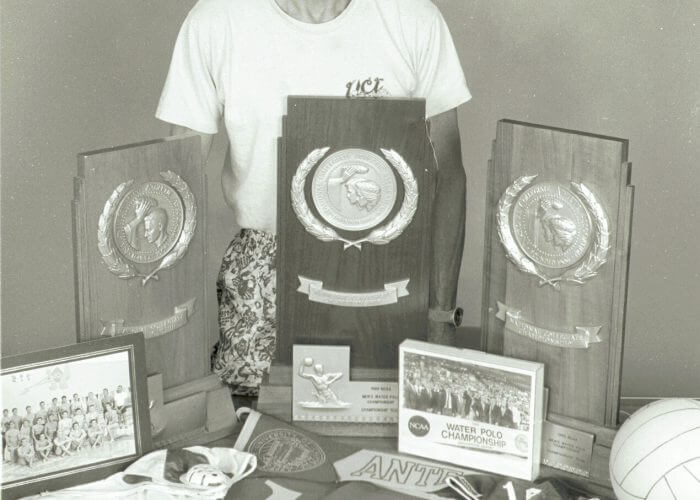
Newland with Anteater NCAA hardware. Photo Courtesy: UC Irvine Athletics
Not that he would have been hung up on this. According to Dettamanti, the former Stanford coach whose teams split two championship matches with Newland’s Anteaters, the legendary coach: “did things his way! He never minced words; he always told the truth—whether you liked it or not.”
Speaking from travels in Ecuador, Dettamanti, who as a young coach first encountered the imposing Newland in 1973 while coaching UCSB, said it was a thrill to be mentioned on the same page as Cutino, Horn and Newland—the “Big Three” who from 1969 to 1976 rotated ownership of NCAA men’s hardware.
[Passages: Bob Horn, U.S. Olympic and UCLA Men’s Swimming and Water Polo Coach, Passes Away at 87]
“Those were three guys I always admired,” said Dettamanti—“Kid,” to the Old Man. “I knew I had finally arrived as a coach when in the ’73 championships, I looked in the program and there’s Newland’s name, Cutino’s name and Horn’s name—and Dettamanti, coach of UC Santa Barbara.”
Speaking about their encounters, in 1982 UCI completed an undefeated season (30-0) at Stanford’s expense, after a perfect Cardinal campaign in 1981. The finals, a 7-4 win by the Anteaters, contained its own twist: both current Stanford water polo coaches were in the pool that day. John Vargas, now the school’s head men’s coach, played for Newland, while John Tanner, who leads the Stanford’s women, played for the Cardinal.
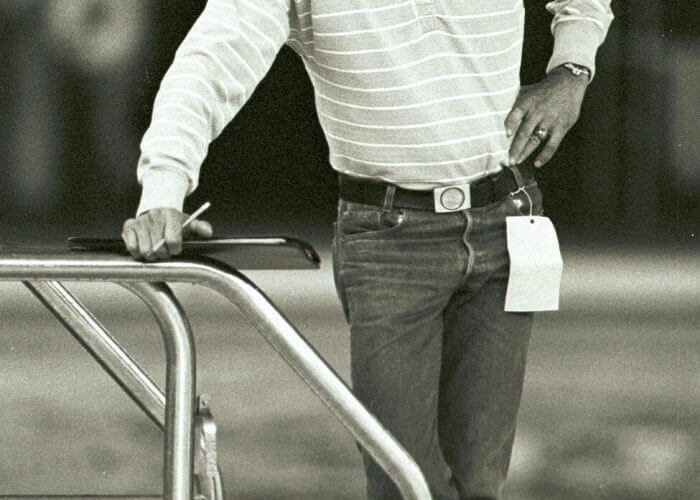
Photo Courtesy: UC Irvine Athletics
The 1985 final was a different story. In a match that Dettamanti—who won eight titles at Stanford—called the most memorable of his career, after a back-and-forth affair, the Anteaters scored with 13 seconds left to go ahead. The Cardinal were down a goal and out of time-outs.
“We went down the pool and Matt Tingler—the smallest guy on our team—threw a lob shot that went over the goalie’s head to tie the game. Then we won it in overtime,” Dettamanti said of his team’s 12-11 victory.
There was another UCI title in 1989, then a shift in the sport, as success at Stanford, Cal, UCLA and USC crowded out everyone else, including the Anteaters. But that didn’t change the Old Man; in fact, nothing ever did.
“He was unique; I don’t think there’s ever been anybody like Newland,” the ex-Cardinal coach said.
And—likely—there never will.




Antonio Busquets
Jose Busquets
Fernando Delgado Sellas
Carlos Berrios Rivera
Carlos Lomba sad
Carlos Berrios Rivera una leyenda
Victor Diaz Paunetto
It was a pleasure playing for him. He coached both, Mariano and me. We will miss the “old man”.
Sorry for your loss